Russia Unleashes Air Attacks On Ukraine Using Missiles, Iranian Drones

Russia pounded Ukraine with missiles and Iranian drones in waves of attacks Thursday, killing at least 11 people, damaging buildings and energy facilities.

Russia pounded Ukraine with missiles and Iranian drones in waves of attacks Thursday, killing at least 11 people, damaging buildings and energy facilities.
The attack came one day after Ukraine secured pledges of main battle tanks from Germany and the United States to beef up its troops - a move that infuriated Russian officials.
The military said its air defences shot down all 24 drones unleashed by Russia overnight. Fifteen of them were downed around Kyiv where there were no reports of any damage, they said.
Iran’s Islamic government has supplied hundreds of drones to Russia since mid-2022 that have been used during missile attacks to inflict more damage or to swamp Ukrainian air defenses. The United States and Europe have imposed new sanctions on Tehran for its expanded military ties with Moscow and also its deadly crackdown on protests since last September.
Air defences shot down 47 of 55 missiles that included at least one Kh-47 Kinzhal hypersonic missile, General Valeriy Zaluzhnyi, Ukraine's top military commander, said.
As many as six Tu-95 strategic bombers launched long-range missiles after taking off from the Arctic region of Murmansk in northern Russia and launched long-range missiles, Air Force spokesperson Yuriy Ihnat said.
Prime Minister Denys Shmyhal said Russia's main target had been energy facilities and that the strikes aimed to deprive Ukrainians "of light and heating" with the temperature in Kyiv at below freezing.
With reports by Reuters
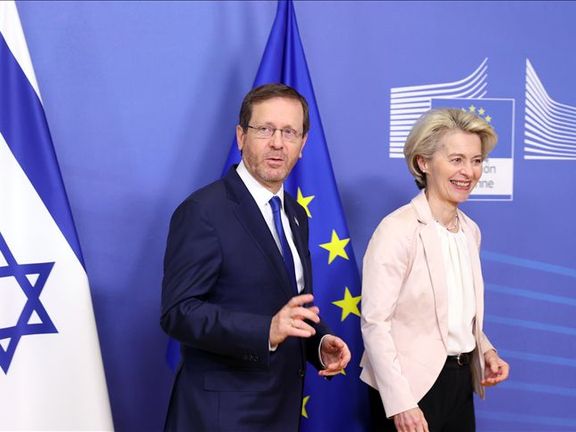
Israeli President Isaac Herzog has called on Europe to take a firm stance against Iran as it poses a challenge to Israel, the region, Europe, and the world.
Herzog made the comments Wednesday in a meeting with European Commission President Ursula von der Leyen in Brussels.
“Iran is fighting Ukrainian citizens by supplying drones and lethal weapons, endangering the world by rushing toward nuclear capabilities, killing and torturing its own citizens,’’ he stated.
Earlier this week, the European Parliament approved a resolution with absolute majority to designate Iran’s Islamic Revolutionary Guard Corps (IRGC) as a terrorist organization. However, the EU refused to do so, with its Foreign Policy Chief Josep Borrell saying the move needs a ruling by a European court.
The West on Monday stepped up pressure on Iran over its crackdown on protests and arms supply for the Russian invasion of Ukraine. The US, the European Union and United Kingdom imposed fresh sanctions on Tehran.
Members of the European Parliament as well as Iranians have called on European politicians to declare the IRGC as a terror group, as it is responsible for leading most of the security forces who killed, maimed and arrested protesters.
The issue of Europe listing the IRGC emerged in recent weeks as the Iranian regime has killed more than 500 people during popular protests that started in September, after the death of Mahsa Amini in hijab police custody.
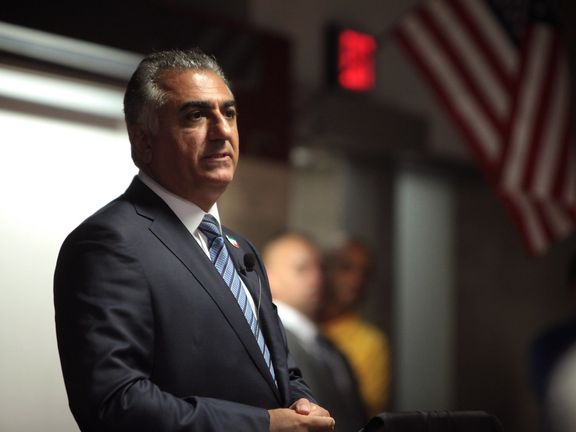
Iran’s exiled Prince Reza Pahlavi has announced his plans to visit different countries in the next few weeks and meet with top officials and parliamentarians.
In an interview with Sky News, Prince Reza Pahlavi emphasized that he is not looking for power, adding that "My only goal is to bring our country to a point where the Iranian people, in a free and fair election can determine their own future in terms of self-determination."
"I'm not running for any office, nor do I seek any political position in the apparatus of state. I'd rather be an advocate for the people and stand by their side," he underlined.
Reza Pahlavi expressed hope that when the opposition is united and each of its members receive the support of the international community, it will be possible to oust the regime as quickly as possible by staging nationwide strikes.
Once again, he asked all pro-democracy and secular political groups of any aspiration, including left, right and center, to help him form this coalition.
He once again stressed that the process of transition from the Islamic Republic will continue with a transitional government, and finally the people will decide on the political future of Iran through a free referendum.
“The world needs to …begin to think of how they can elevate the pressure by having maximum support …in helping the Iranian people get rid of this regime which is the fundamental problem in the first place,” Pahlavi emphasized.
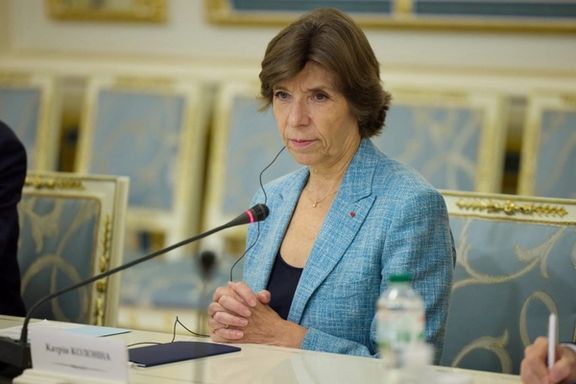
French Foreign Minister Catherine Colonna has called for the release of "seven French hostages" imprisoned in Iran.
According to the French Foreign Ministry, in a phone conversation with her Iranian counterpart Hossein Amir-Abdollahian, Colonna called the detention of French citizens in Iran "arbitrary".
Iran often arrests Western citizens on vague charges and uses them as pawns to pressure their countries.
The French Foreign Minister also asked the Islamic Republic to respect international laws and condemned the repression of protesters in Iran.
According to Iran’s Ministry of Foreign Affairs, Amir-Abdollahian once again called Iran's nationwide protests "riots" and claimed that France "incites riots in Iran".
Amir-Abdollahian further referred to the possibility of Europe designating Iran’s Revolutionary Guard as a terrorist organization, saying that the Islamic republic is closely monitoring the behavior of the European Union and will make its next moves accordingly.
The phone conversation comes less than a week after a resolution was passed in the European Parliament against the IRGC.
Despite the approval of this resolution, EU Foreign Policy Chief Josep Borrell stated that the EU is not able to declare the IRGC a terrorist organization at this stage without a ruling from a European court.
Also, the phone call between the foreign ministers of the Islamic Republic and France comes shortly after Tehran announced sanctions against dozens of individuals and entities of the European Union and the UK, including staffers at the French satirical magazine Charlie Hebdo and the mayor of Paris.
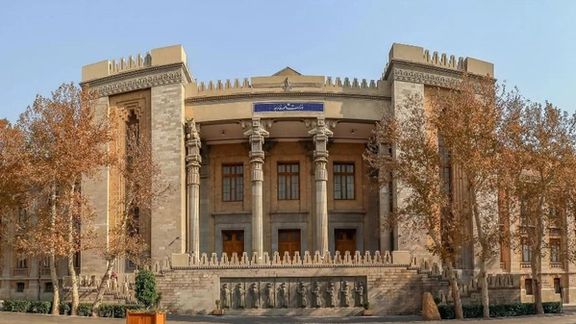
Iran says it has designated over 30 European and British individuals and entities in response to the recent sanctions against its officials over the crackdown on anti-government protests.
The foreign ministry announced in a statement on Wednesday that the targeted EU individuals and entities are targeted “for interference in domestic affairs of the Islamic Republic of Iran and fomenting violence and unrest in Iran.”
Those targeted include Britain’s attorney general and army chief of staff, several European parliamentarians and European military officials.
The French scholar Bernard-Henri Levy and three senior staffers at the French satirical magazine Charlie Hebdo, which recently published a series of cartoons ridiculing Iran’s clerical rulers have been designated by Tehran.
The sanctions would ban the individuals from travelling to Iran and their bank accounts will be blocked. Those targeted are unlikely to have any property in the Islamic Republic, but the symbolic move will confiscate if there were any.
The European Union on Monday imposed sanctions on more than 30 Iranian officials and organizations, including units of the powerful Revolutionary Guards, blaming them for a "brutal" crackdown on unrest and other human rights abuses.
The United States and Britain also issued new sanctions against Iran, reflecting a deterioration in the West's already dire relations with Tehran.
The sanctions are the latest response to Iran's deadly clampdown on unrest after the death of young Iranian Kurdish woman Mahsa Amini in morality police custody in September.
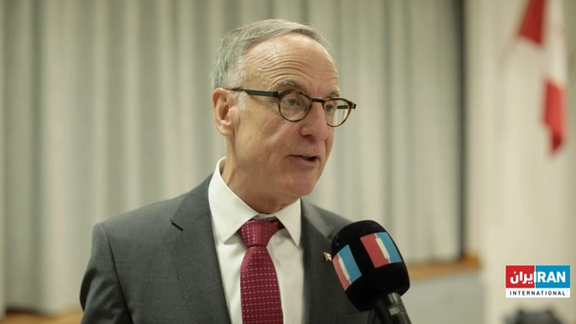
A Canadian lawmaker has told Iran International that Ottawa needs to have a coordinated front against the atrocities of the Islamic Republic and the IRGC, both inside Canada and abroad.
Parliamentary Secretary to the Minister of Foreign Affairs Rob Oliphant told our correspondent that Canada would designate the entirety of Iran’s Revolutionary Guard as a terrorist organization if it was easy and effective to do.
He added that the quickest action the Canadian government can take is limiting the activities of the Islamic Republic “through both the immigration act as well as through the special economic measures act that targets sanctions on those in the IRGC who are most directly responsible for the atrocities which they are committing on behalf of the regime.”
Oliphant maintained that Ottawa plans to sanction somewhere around 10,000 former and current IRGC officers who are the most complicit in atrocities, banning them from coming to Canada or expelling them if they are in the country.
Oliphant added that “We are watching, and we have been absolutely committed to making sure that we get the right people out of the country and not allowed into the country because no one should be able to take advantage of the fact that they’ve been part of the regime; they’ve been part of the murderers, part of the detentions, part of those atrocities.”
In October, Prime Minister Justin Trudeau said Canada has designated Iran's IRGC leadership, adding that “we will restrict financial transactions with the Islamic Republic of Iran associated with the IRGC and the proxies that support them. These actions are some of the strongest measures anywhere against Iran.”
The West on Monday stepped up pressure on Iran over its crackdown on protests and arms supply for the Russian invasion of Ukraine as the US, the European Union and United Kingdom imposed fresh sanctions on Tehran. However, the EU stopped short of designating the IRGC a terrorist outfit, as the European Parliament had voted last week to urge the block to do.
The Canadian official noted that “We are in conversation with other countries to make sure we do it well and we do it as quickly as possible.”
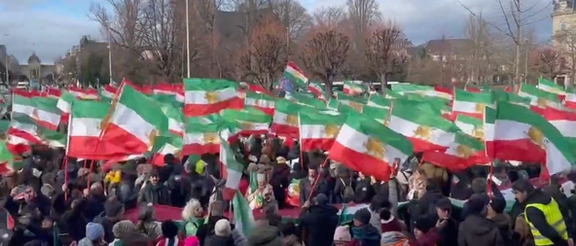
Members of the European Parliament as well as Iranians have called on European politicians to declare the IRGC as a terror group, as it was responsible for leading most of the security forces who killed, maimed and arrested protesters. The issue of Europe listing the IRGC emerged in recent weeks as the Iranian regime has killed more than 500 people during popular protests that started in September, after the death of Mahsa Amini in hijab police custody. Many European officials, including EU Foreign Policy chief Josep Borrell, believe that the move is legally complicated and would obstruct ways to negotiate the revival of the 2015 nuclear deal.
In response to a question about the activities by supporters of the Islamic Republic against the Iranian diaspora in Canada, Oliphant said, “I hear the stories of people who have been harassed, and intimidated; people who feel that there are people who are working for the regime in Canada.”
“What we need is a concerted whole-of-government effort because it’s policing, it’s intelligence, it’s foreign affairs, it’s defense; it’s a series of different people involved in these sorts of decisions. We need to have a one place where people can take their concerns when they have been intimidated, harassed... those things need to be investigated. We need to find out whether Canadian laws have been broken and move ahead. It’s too complicated right now. People don’t know who to call.”
Calling on the Canadians to “go to the local police” if they feel any kind of threat, he added that “There should be one place where people can go to lay a complaint, bring evidence, show it and then it can be investigated. We have the resources now to do it. We just need to put it in a place for public safety particularly by making sure all branches of the government get this work done.”